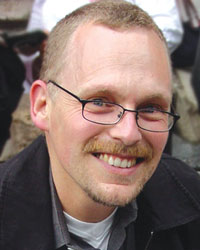Matthias R. Mehl
 University of Arizona, USA
University of Arizona, USA
http://dingo.sbs.arizona.edu/~mehl/
What does your research focus on?
I am interested in the psychological implications of people’s everyday social lives. What do people do in their daily lives? And why do they do the things they do? In most of my research, I use a naturalistic observation sampling method, the Electronically Activated Recorder (or EAR), to track people’s moment-to-moment social behavior in the real world. The EAR is a digital audio recorder that periodically and unobtrusively records snippets of ambient sounds from participants’ immediate environments as they go about their days. That way, it produces an acoustic log of their social behaviors and interactions as they naturally unfold. My current research focuses on (1) individual differences in everyday social life and the role they play for understanding personality, culture, and gender and (2) how people use their everyday social lives for coping with upheavals (e.g., national disasters, personal illnesses).
What drew you to this line of research? Why is it exciting to you?
What initially drew me to this research (and to the development of the EAR method) was my graduate school advisor’s well-known skepticism towards self-report. It is so exciting to me because of the incredibly rich data that we obtain when we do an EAR study. The ambient sound bites are so full of fascinating, first-hand, real-world psychology that I often wish I would find more time to listen to them. Unfortunately, a lot of the vividness is lost in conversion to numbers. But we’re trying hard to keep the rich flavor alive in our studies.
Who were/are your mentors or psychological influences?
I feel fortunate to have mentors on both sides of the Atlantic. The person who introduced me to research and who first fostered my academic interests is Joachim Brunstein. He also nominated me for the fellowship that ultimately allowed me to study abroad for a year. During this pre-graduate-school year at the University of Texas at Austin it was Jamie Pennebaker who metaphorically grabbed me with his excitement for research and who — advertently or inadvertently — ensured that I would not return to Germany to continue my training there as planned. Finally, in graduate school, I had the privilege to be mentored by two great people — Jamie Pennebaker and Sam Gosling — who, at least seemingly, couldn’t have been more different in their mentoring styles and who complemented each other in a way that provided me with exactly what I needed. Despite their different approaches, both contributed in similar ways to making graduate school a fun and highly gratifying experience for me. I am deeply grateful to them.
To what do you attribute your success in the science?
1. Great mentors who believed in me (see Question 3)
2. Enjoyment of the research process (as a result of 1)
3. Knowing where I belong; having worked in “the real world,” I happily and humbly returned to academia
4. Effort and persistence
5. Luck, luck, luck
What’s your future research agenda?
I want to do interesting research at the intersection of personality, social environments, and health. And I would like to strengthen naturalistic observation as a viable research approach in psychology.
Any advice for even younger psychological scientists? What would you tell someone just now entering graduate school or getting their PhD?
I well remember the advice a professor gave me when I was still an undergraduate student. I think it is as valid today as it was back then, and I am sure it applies well beyond Germany. She said “If you want to be a professor, do what you want to do, go full steam, and reach for the stars; yet, at the same time, don’t be naive — nothing in life is fully under your control, so make sure you have a viable back-up option.”
What publication you are most proud of or feel has been most important to your career?
That’s a tough one. I guess, I am most proud of our Brevia in Science.
Mehl, M. R., Vazire, S., Ramírez-Esparza, N., Slatcher, R. B., & Pennebaker, J. W. (2007). Are women really more talkative than men? Science, 317, 82.
Clearly, I am not a gender researcher and I am not primarily proud of it because we found that, despite the very strong stereotype, women and men seem to talk just about equally much. Rather, I am proud of it because (a) its finding rests, in essence, on a simple comparison of means and it would have been just about as compelling had we not done any significance testing — good science doesn’t always require high-end statistics, and (b) we found that, whereas the least talkative person in our sample used an estimated 695 words, the most talkative one managed to utter more than 47,000 words per day (incidentally, both were male) — what a range and what graspable evidence of the magnitude of individual differences.





APS regularly opens certain online articles for discussion on our website. Effective February 2021, you must be a logged-in APS member to post comments. By posting a comment, you agree to our Community Guidelines and the display of your profile information, including your name and affiliation. Any opinions, findings, conclusions, or recommendations present in article comments are those of the writers and do not necessarily reflect the views of APS or the article’s author. For more information, please see our Community Guidelines.
Please login with your APS account to comment.